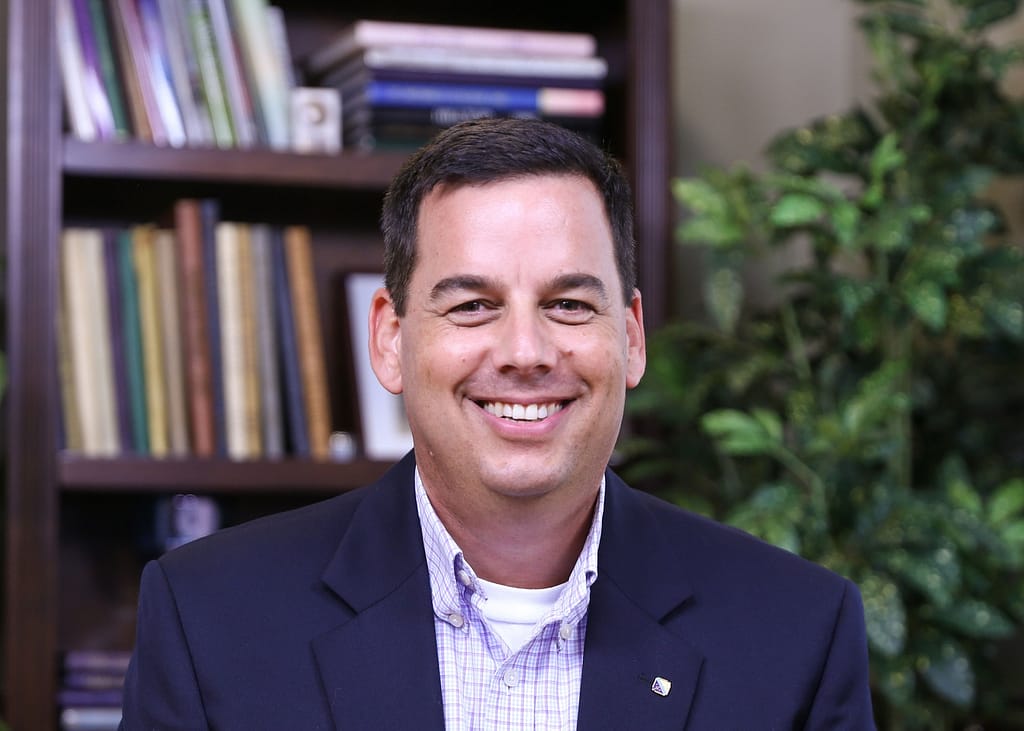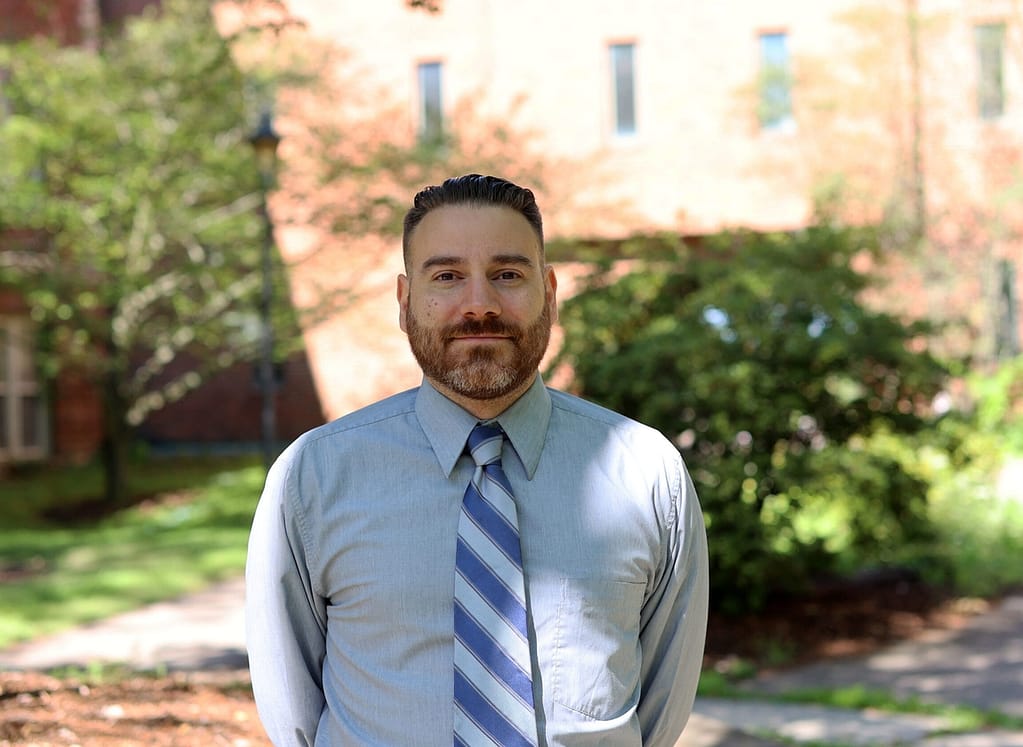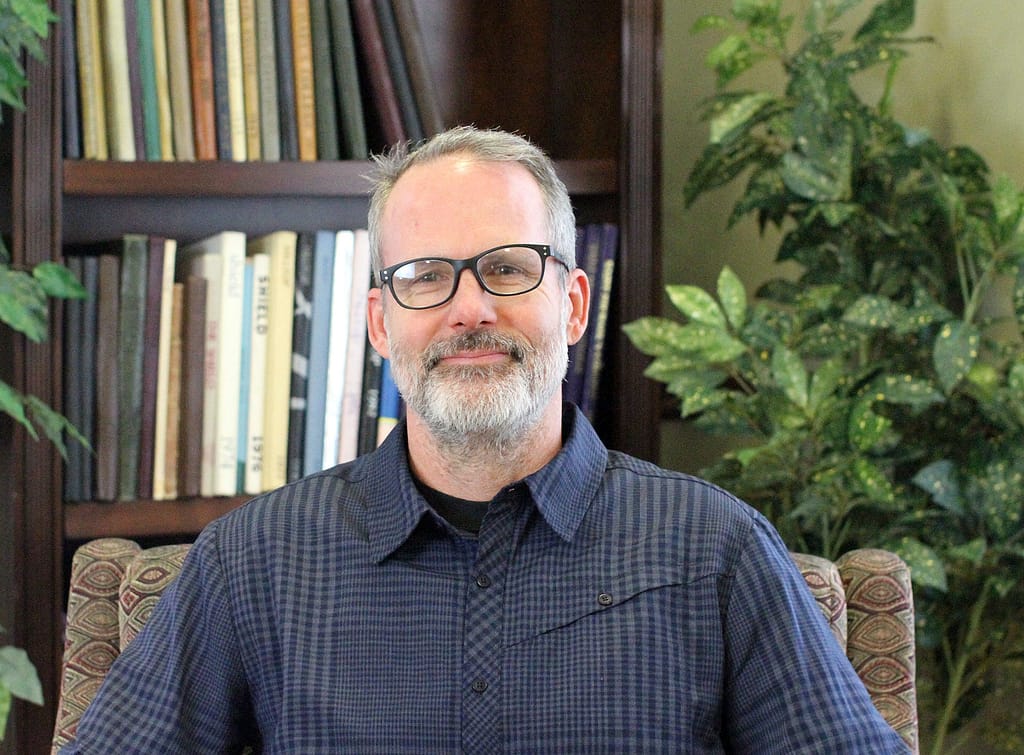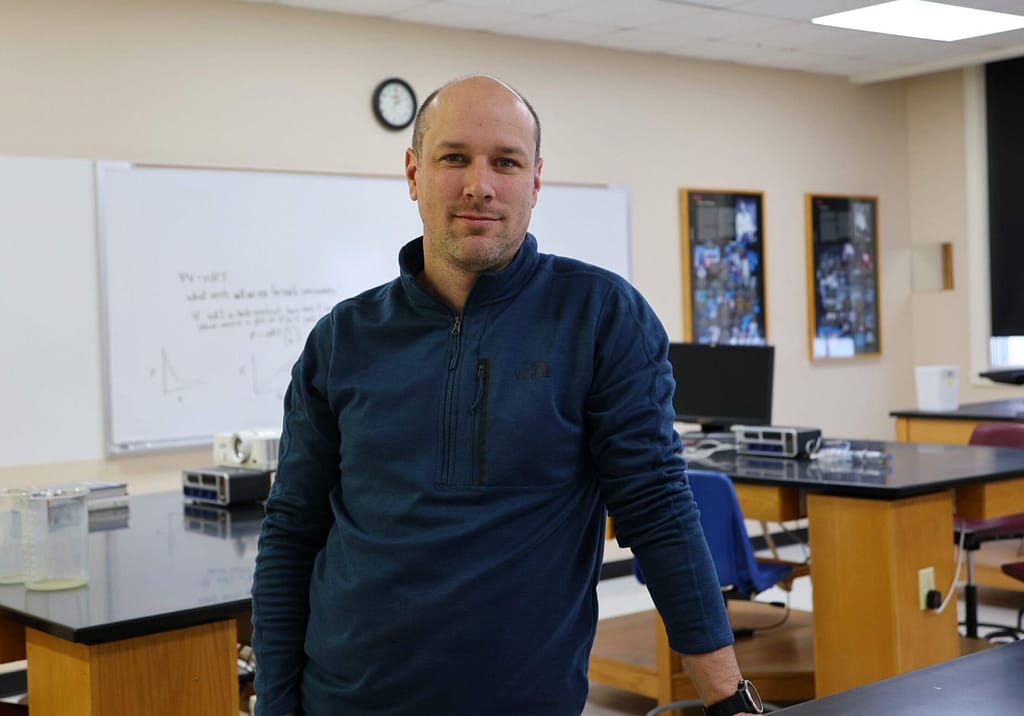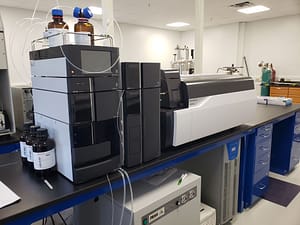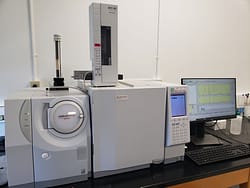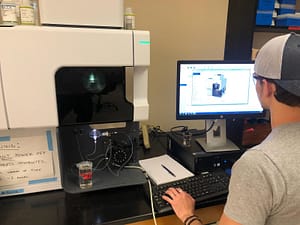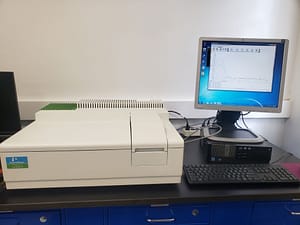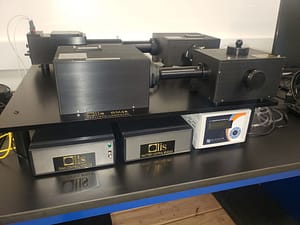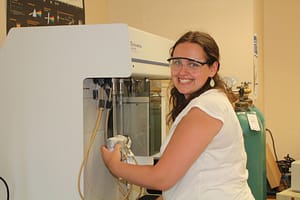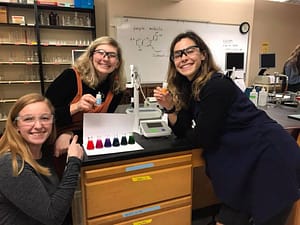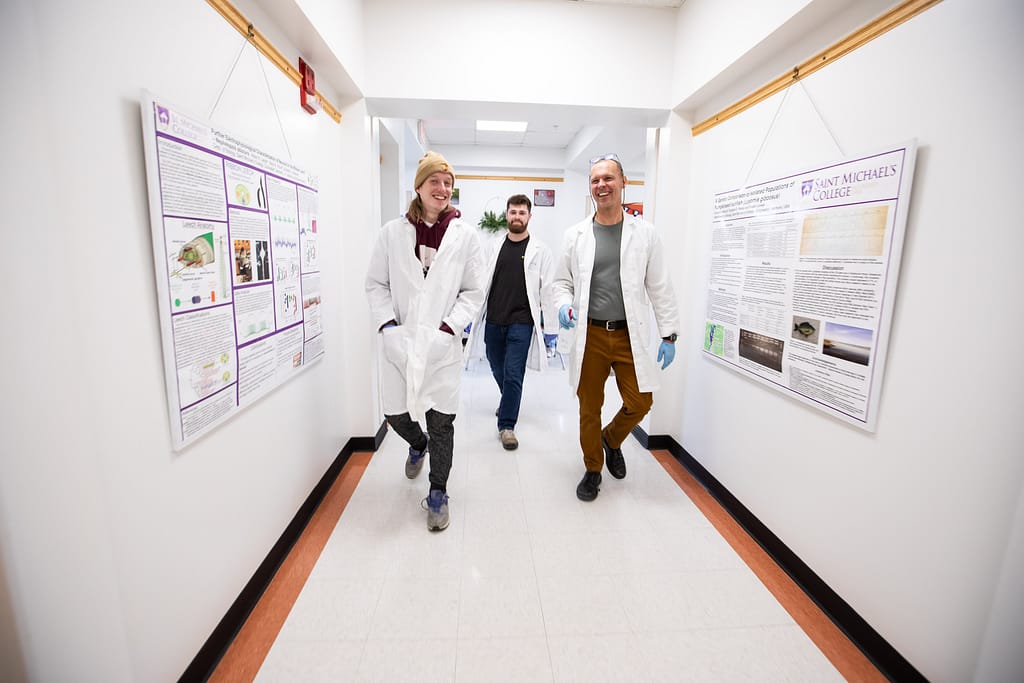About
The chemistry curriculum at Saint Michael’s College combines small class sizes, excellent faculty and personal attention with the opportunity to gain practical, hands-on experience with laboratory instrumentation early in your college career.
Our program is approved by the American Chemical Society – a designation that is important to both graduate schools and employers.
A bachelor’s degree in chemistry prepares you for employment in government and industrial laboratories or for further study in graduate or professional schools. By choosing appropriate electives, a major in chemistry can lead to a career in medicine, dentistry, allied health sciences, law or the business world.
Our chemistry program has an excellent track record for acceptance to graduate and professional schools. Recently, our alumni have gone on to graduate programs at such schools as Dartmouth, Duke, Tufts, and Yale.
Learn more about the Chemistry program from our Saint Michael’s professors in the video below:
In Depth
Our program focuses on preparing you to succeed in industry and academia by helping you develop the skills to solve chemical problems, to read meaningfully and to utilize properly chemical literature, to work effectively and safely in the laboratory, to communicate scientific ideas and discoveries both orally and in writing, to function well as a member of a team, and to make ethical decisions in the area of science.
Chemistry is the study of matter and its changes. As a chemistry major, you will start with the science and math courses that provide the background necessary to study chemistry. Those courses include General Chemistry I &II, Organic Chemistry I &II, Calculus I &II, College Physics I &II, and Integrated Chemical Analysis. In these introductory chemistry courses, you will gain a broad overview of the many different topics in chemistry, including stoichiometry, bonding, gases, the structure of atoms and molecules, acid-base theory, organic synthesis, error analysis, ethical issues in science, and quantitative analysis. Then you will go on to study further in the areas of inorganic chemistry, physical chemistry, biochemistry and chemical instrumentation, where you will learn about thermodynamics, kinetics, quantum chemistry and spectroscopy, the structure and formation of coordination compounds, group theory, some of the major categories of structures that make up biological systems (including peptides/proteins, carbohydrates and nucleic acids), and the chemical instrumentation that can be used to study the structure and function of molecules.
As a senior, you will research a chemistry topic in great depth as part of your capstone course, Senior Seminar. You will have two options: you may either prepare a major report on the topic or develop a related research proposal (modeled after the process whereby scientists procure funding for research). For examples of recent chemistry senior projects, go to Seminar Projects. You will also be strongly encouraged to conduct academic research or complete an internship as part of your education.
Careers
After graduation, our majors go on to careers like:
- Adhesive Chemist
- Animal Nutritionist
- Agricultural Chemist
- Atmospheric Chemist
- Biotechnology Researcher
- Business Development Director
- Ceramics Engineer
- Chemical Consulting
- Chemical Educator
- Chemical Facilities Manager (Local, Global, Military)
- Chemical Information Specialist-Software (Private, Public)
- Chemical Safety Consultant (Academic, Military, Health)
- Chemical Sales
- Chemistry Professor
- Clinical Research
- Consumer Safety Officer
- Entrepreneur
- Environmental Protection Agency (air, water, waste)
- Environmental Chemist
- Food Safety Evaluator (USDA, Private)
- Food Chemist
- Forensic Pharmaceutical Analysis (Private, FDA)
- Forensic Chemist
- Fragrance Chemist
- Geochemist
- Glass Chemist (Auto, Consumer, Safety)
- High School Teacher
- Human Resources Director
- Marketing and Communications Consultant
- Materials Chemist (NASA, Private, Military)
- Medical Doctor
- Medical Equipment Developer
- Medicinal Chemist (FDA, Private)
- Metals Manufacturing (Mining, Processing, Alloys)
- Nanotechnology
- National Institutes of Health Researcher
- Vitamin and Supplement Chemist
- Petroleum Chemist (Oil Industry, Auto)
- Paint Specialist
- Patent Agent (Private, Academic)
- Patent Attorney (Private, Government)
- Pharmaceutical Chemist (Develop Drug Molecules)
- Plant Engineering
- Polymer Chemist (Plastics, Fibers)
- Pulp and Paper Chemist
- Rubber Chemist (Recycling, Auto, Synthetic)
- Surface Chemist (Computer Chips, Drug Development)
- Textile Chemist
- U.S. Department of Energy (Solve the Energy Crisis)
- Waste Management (Chemical and Hazardous Waste)
- Water Treatment Chemist (Municipal, Private, Federal)
Graduate Study
Our chemistry program has an excellent track record for acceptance to graduate and professional schools. Forty-two percent of our chemistry and biochemistry graduates immediately attend graduate science or medical schools.
Graduate schools they have attended recently include:
- Boston University
- Dartmouth College
- Duke University
- Tufts University
- University College of Dublin
- University of Connecticut
- University of Maryland
- University of Massachusetts
- University of Pennsylvania
- University of Rochester
- University of Vermont
- University of Washington State
- University of Wisconsin
- West Virginia University
- Yale University
Research
The Chemistry Department at Saint Michael’s College strongly encourages students to pursue research opportunities based upon their interests and career goals. There are numerous opportunities to conduct research in all areas of chemistry, either with Saint Michael’s faculty members or off campus at national laboratories and at institutions throughout the country.
In fact, most chemistry majors graduate having spent one or more summers conducting research. Funds are available to support students who want to work on advanced research during the summer. They also have opportunities to present their research results at local and national meetings. Recent summer research projects by chemistry majors include:
- Computational Calculation of the Mulliken Charge Densities and Dipole Moments of Solvatoflourchromic Dyes
- The Investigation of Ionic Liquids as a Tool for the Synthesis of Porous Zirconia Catalysts
- Investigation of Ultrahigh Surface Area and Highly Graphitic Carbon for the Removal of Gasoline Based Pollutants from Ground Water
- Synthesis, Purification and Characterization of a Selenouracil Derivative
- Oxidation of Cyclohesanol with Catalytic Cobalt (II) Chloride in SBA-16
- Building a Protein-Based Therapeutic for the Treatment of Prostate Cancer
- Spectrophotometric Analysis of Fluorinated Compounds in Ski Wax
- Purification and Expression of Modified Calmodulin Protein
- The Carbon Coated MgO (111) as a Catalyst in an Aqueous Environment
- Synthesis and Catalytic Testing of High Surface Area Strontium Oxide, Barium Oxide and Mixed Metal Oxides to Yield Biodiesel from Waste Phospholipids Procured from Algae
An excellent site for finding research opportunities for students can be found at the National Science Foundation.
Current and prospective students in the natural sciences, math and engineering can find other research opportunities at the Web Guide to Research for Undergraduates.
Chemistry and biochemistry faculty members encourage interested students to e-mail or call them directly to speak about possible opportunities that exist in the department.
Instrumentation
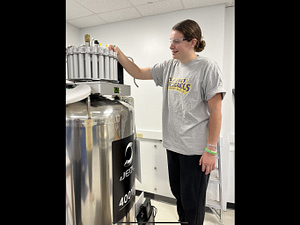
JEOL ECZ 400YH NMR Spectrometer
Next generation 2‐channel NMR spectrometer ECZL S series is a model dedicated to 400 MHz solutions‐state NMR while incorporating the high performance digital high frequency technology of the ECZL series.
Nuclear Magnetic Resonance (NMR) spectroscopy is an analytical chemistry technique used in quality control and research for determining the content and purity of a sample as well as its molecular structure. For example, NMR can quantitatively analyze mixtures containing known organic compounds.
Liquid Chromatography‐Mass Spectrometer
Shimadzu LCMS‐8045 High‐Performance Liquid Chromatograph Mass Spectrometer
The triple quadrupole LCMS‐8045 is the workhorse instrument in the Shimadzu LC‐MS/MS lineup. The heated ESI probe, high‐temperature heating block, heated desolvation line, drying gas, and focusing optics all act to maximize sensitivity while minimizing contamination. This means continuous operation in the laboratory with reliable data collection, even for complex matrices like biological fluids or foods.
Gas Chromatography‐Mass Spectrometer
Shimadzu GCMS‐QP2010 SE
The GCMS‐QP2010 SE is a single quadrupole gas chromatograph‐mass spectrometer offering stable and cost‐effective analysis for challenging compounds. A high‐performance quadrupole mass filter ensures high sensitivity in both quantitative and qualitative analysis.
Inductively Coupled Plasma‐Optical Emission Spectrophotometer
Agilent 5110 ICP‐OES
ICP‐OES is a technique in which the composition of elements in (mostly water‐dissolved) samples can be determined using plasma and a spectrometer. The Agilent 5110 allows for highest analytical precision and fast analysis with the unique dichroic spectral combiner (DSC) that enables synchronous radial and axial measurements. Reduced running costs and increased productivity are achieved by minimizing sample uptake, stabilization times, and rinse delays.
UV‐Vis Spectrophotometer
PerkinElmer LAMBDA 35
Our UV/Vis spectrophotometer is a high performance UV/Vis system designed for research. The instrument meets industry standards for ultra‐high performance, flexibility, and convenience.
Infra‐red Spectrophotometer
Shimadzu LCMS‐8045 High‐Performance Liquid Chromatograph Mass Spectrometer
The triple quadrupole LCMS‐8045 is the workhorse instrument in the Shimadzu LC‐MS/MS lineup. The heated ESI probe, high‐temperature heating block, heated desolvation line, drying gas, and focusing optics all act to maximize sensitivity while minimizing contamination. This means continuous operation in the laboratory with reliable data collection, even for complex matrices like biological fluids or foods.
Spectrofluorimeter
Olis DM 45 Scanning Spectrofluorimeter
The Olis DM 45 scanning spectrofluorimeter is a research quality scanning spectrofluorimeter. Standard detection is achieved with a highest sensitivity photon counting module, with a useful spectral range of 250‐850 nm.
The two Olis single grating monochromators have accessible gratings for easy optimization of the hardware for different spectral ranges, from the far UV (>180 nm) to the NIR (<2600 nm). The model is optimized for UV/Vis. Emission, excitation, and synchronous scanning are supported.
Automated Surface Area and Porosity Analyzer
Micromeritics ASAP 2020
The ASAP 2020 Plus is a high‐performance adsorption analyzer for measuring surface area, pore size, and pore volume of powders and porous materials. Standard Methods can be used to characterize adsorbents, catalysts, zeolites, MOFs, APIs, excipients, and a wide variety of porous and non‐porous materials. The ASAP 2020 Plus is ideally suited for gas adsorption analysis of microporous (0.35 to 2nm) and mesoporous (2 to 50nm) materials and delivers superior accuracy, resolution and data reduction.
Additional Equipment
The Chemistry Department is equipped with other instruments and equipment useful for analysis or sample preparation.
pH Meters
Analytical Balances Automated Chromatography UV‐Vis Plate Reader Muffle Furnace
Tube Furnace
Ovens
Sonicators
Roto evaporators Polarimeters
Microwave Reactor Centrifuges
Schlenk Lines
In Depth
Our program focuses on preparing you to succeed in industry and academia by helping you develop the skills to solve chemical problems, to read meaningfully and to utilize properly chemical literature, to work effectively and safely in the laboratory, to communicate scientific ideas and discoveries both orally and in writing, to function well as a member of a team, and to make ethical decisions in the area of science.
Chemistry is the study of matter and its changes. As a chemistry major, you will start with the science and math courses that provide the background necessary to study chemistry. Those courses include General Chemistry I &II, Organic Chemistry I &II, Calculus I &II, College Physics I &II, and Integrated Chemical Analysis. In these introductory chemistry courses, you will gain a broad overview of the many different topics in chemistry, including stoichiometry, bonding, gases, the structure of atoms and molecules, acid-base theory, organic synthesis, error analysis, ethical issues in science, and quantitative analysis. Then you will go on to study further in the areas of inorganic chemistry, physical chemistry, biochemistry and chemical instrumentation, where you will learn about thermodynamics, kinetics, quantum chemistry and spectroscopy, the structure and formation of coordination compounds, group theory, some of the major categories of structures that make up biological systems (including peptides/proteins, carbohydrates and nucleic acids), and the chemical instrumentation that can be used to study the structure and function of molecules.
As a senior, you will research a chemistry topic in great depth as part of your capstone course, Senior Seminar. You will have two options: you may either prepare a major report on the topic or develop a related research proposal (modeled after the process whereby scientists procure funding for research). For examples of recent chemistry senior projects, go to Seminar Projects. You will also be strongly encouraged to conduct academic research or complete an internship as part of your education.
Careers
After graduation, our majors go on to careers like:
- Adhesive Chemist
- Animal Nutritionist
- Agricultural Chemist
- Atmospheric Chemist
- Biotechnology Researcher
- Business Development Director
- Ceramics Engineer
- Chemical Consulting
- Chemical Educator
- Chemical Facilities Manager (Local, Global, Military)
- Chemical Information Specialist-Software (Private, Public)
- Chemical Safety Consultant (Academic, Military, Health)
- Chemical Sales
- Chemistry Professor
- Clinical Research
- Consumer Safety Officer
- Entrepreneur
- Environmental Protection Agency (air, water, waste)
- Environmental Chemist
- Food Safety Evaluator (USDA, Private)
- Food Chemist
- Forensic Pharmaceutical Analysis (Private, FDA)
- Forensic Chemist
- Fragrance Chemist
- Geochemist
- Glass Chemist (Auto, Consumer, Safety)
- High School Teacher
- Human Resources Director
- Marketing and Communications Consultant
- Materials Chemist (NASA, Private, Military)
- Medical Doctor
- Medical Equipment Developer
- Medicinal Chemist (FDA, Private)
- Metals Manufacturing (Mining, Processing, Alloys)
- Nanotechnology
- National Institutes of Health Researcher
- Vitamin and Supplement Chemist
- Petroleum Chemist (Oil Industry, Auto)
- Paint Specialist
- Patent Agent (Private, Academic)
- Patent Attorney (Private, Government)
- Pharmaceutical Chemist (Develop Drug Molecules)
- Plant Engineering
- Polymer Chemist (Plastics, Fibers)
- Pulp and Paper Chemist
- Rubber Chemist (Recycling, Auto, Synthetic)
- Surface Chemist (Computer Chips, Drug Development)
- Textile Chemist
- U.S. Department of Energy (Solve the Energy Crisis)
- Waste Management (Chemical and Hazardous Waste)
- Water Treatment Chemist (Municipal, Private, Federal)
Graduate Study
Our chemistry program has an excellent track record for acceptance to graduate and professional schools. Forty-two percent of our chemistry and biochemistry graduates immediately attend graduate science or medical schools.
Graduate schools they have attended recently include:
- Boston University
- Dartmouth College
- Duke University
- Tufts University
- University College of Dublin
- University of Connecticut
- University of Maryland
- University of Massachusetts
- University of Pennsylvania
- University of Rochester
- University of Vermont
- University of Washington State
- University of Wisconsin
- West Virginia University
- Yale University
Research
The Chemistry Department at Saint Michael’s College strongly encourages students to pursue research opportunities based upon their interests and career goals. There are numerous opportunities to conduct research in all areas of chemistry, either with Saint Michael’s faculty members or off campus at national laboratories and at institutions throughout the country.
In fact, most chemistry majors graduate having spent one or more summers conducting research. Funds are available to support students who want to work on advanced research during the summer. They also have opportunities to present their research results at local and national meetings. Recent summer research projects by chemistry majors include:
- Computational Calculation of the Mulliken Charge Densities and Dipole Moments of Solvatoflourchromic Dyes
- The Investigation of Ionic Liquids as a Tool for the Synthesis of Porous Zirconia Catalysts
- Investigation of Ultrahigh Surface Area and Highly Graphitic Carbon for the Removal of Gasoline Based Pollutants from Ground Water
- Synthesis, Purification and Characterization of a Selenouracil Derivative
- Oxidation of Cyclohesanol with Catalytic Cobalt (II) Chloride in SBA-16
- Building a Protein-Based Therapeutic for the Treatment of Prostate Cancer
- Spectrophotometric Analysis of Fluorinated Compounds in Ski Wax
- Purification and Expression of Modified Calmodulin Protein
- The Carbon Coated MgO (111) as a Catalyst in an Aqueous Environment
- Synthesis and Catalytic Testing of High Surface Area Strontium Oxide, Barium Oxide and Mixed Metal Oxides to Yield Biodiesel from Waste Phospholipids Procured from Algae
An excellent site for finding research opportunities for students can be found at the National Science Foundation.
Current and prospective students in the natural sciences, math and engineering can find other research opportunities at the Web Guide to Research for Undergraduates.
Chemistry and biochemistry faculty members encourage interested students to e-mail or call them directly to speak about possible opportunities that exist in the department.
Instrumentation

JEOL ECZ 400YH NMR Spectrometer
Next generation 2‐channel NMR spectrometer ECZL S series is a model dedicated to 400 MHz solutions‐state NMR while incorporating the high performance digital high frequency technology of the ECZL series.
Nuclear Magnetic Resonance (NMR) spectroscopy is an analytical chemistry technique used in quality control and research for determining the content and purity of a sample as well as its molecular structure. For example, NMR can quantitatively analyze mixtures containing known organic compounds.
Liquid Chromatography‐Mass Spectrometer
Shimadzu LCMS‐8045 High‐Performance Liquid Chromatograph Mass Spectrometer
The triple quadrupole LCMS‐8045 is the workhorse instrument in the Shimadzu LC‐MS/MS lineup. The heated ESI probe, high‐temperature heating block, heated desolvation line, drying gas, and focusing optics all act to maximize sensitivity while minimizing contamination. This means continuous operation in the laboratory with reliable data collection, even for complex matrices like biological fluids or foods.
Gas Chromatography‐Mass Spectrometer
Shimadzu GCMS‐QP2010 SE
The GCMS‐QP2010 SE is a single quadrupole gas chromatograph‐mass spectrometer offering stable and cost‐effective analysis for challenging compounds. A high‐performance quadrupole mass filter ensures high sensitivity in both quantitative and qualitative analysis.
Inductively Coupled Plasma‐Optical Emission Spectrophotometer
Agilent 5110 ICP‐OES
ICP‐OES is a technique in which the composition of elements in (mostly water‐dissolved) samples can be determined using plasma and a spectrometer. The Agilent 5110 allows for highest analytical precision and fast analysis with the unique dichroic spectral combiner (DSC) that enables synchronous radial and axial measurements. Reduced running costs and increased productivity are achieved by minimizing sample uptake, stabilization times, and rinse delays.
UV‐Vis Spectrophotometer
PerkinElmer LAMBDA 35
Our UV/Vis spectrophotometer is a high performance UV/Vis system designed for research. The instrument meets industry standards for ultra‐high performance, flexibility, and convenience.
Infra‐red Spectrophotometer
Shimadzu LCMS‐8045 High‐Performance Liquid Chromatograph Mass Spectrometer
The triple quadrupole LCMS‐8045 is the workhorse instrument in the Shimadzu LC‐MS/MS lineup. The heated ESI probe, high‐temperature heating block, heated desolvation line, drying gas, and focusing optics all act to maximize sensitivity while minimizing contamination. This means continuous operation in the laboratory with reliable data collection, even for complex matrices like biological fluids or foods.
Spectrofluorimeter
Olis DM 45 Scanning Spectrofluorimeter
The Olis DM 45 scanning spectrofluorimeter is a research quality scanning spectrofluorimeter. Standard detection is achieved with a highest sensitivity photon counting module, with a useful spectral range of 250‐850 nm.
The two Olis single grating monochromators have accessible gratings for easy optimization of the hardware for different spectral ranges, from the far UV (>180 nm) to the NIR (<2600 nm). The model is optimized for UV/Vis. Emission, excitation, and synchronous scanning are supported.
Automated Surface Area and Porosity Analyzer
Micromeritics ASAP 2020
The ASAP 2020 Plus is a high‐performance adsorption analyzer for measuring surface area, pore size, and pore volume of powders and porous materials. Standard Methods can be used to characterize adsorbents, catalysts, zeolites, MOFs, APIs, excipients, and a wide variety of porous and non‐porous materials. The ASAP 2020 Plus is ideally suited for gas adsorption analysis of microporous (0.35 to 2nm) and mesoporous (2 to 50nm) materials and delivers superior accuracy, resolution and data reduction.
Additional Equipment
The Chemistry Department is equipped with other instruments and equipment useful for analysis or sample preparation.
pH Meters
Analytical Balances Automated Chromatography UV‐Vis Plate Reader Muffle Furnace
Tube Furnace
Ovens
Sonicators
Roto evaporators Polarimeters
Microwave Reactor Centrifuges
Schlenk Lines
